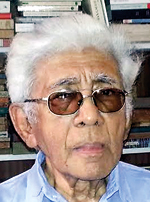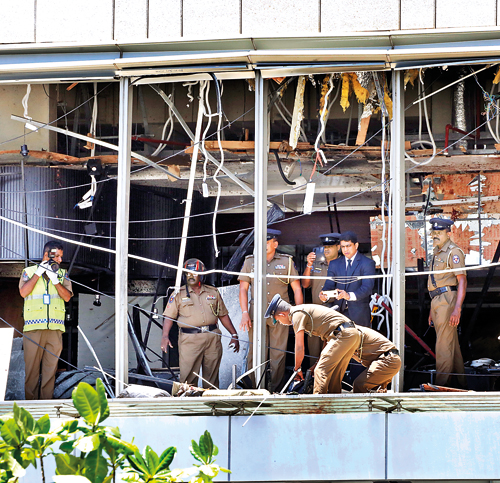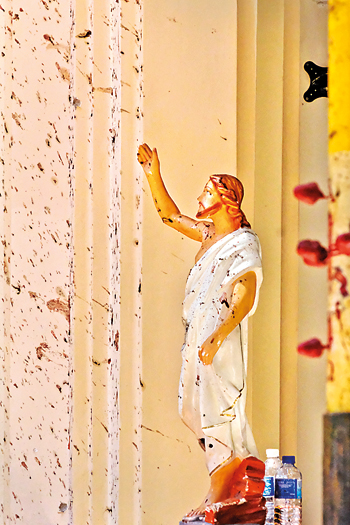Letters to the Editor
View(s):His low profile belied his stellar achievements
Izeth Hussain
 The passing of N.M.M. Izeth Hussain removes one of few illustrious civil servants who embodied great intellectual grasp, exacting personal integrity and consequential professionalism in our nation’s public service.
The passing of N.M.M. Izeth Hussain removes one of few illustrious civil servants who embodied great intellectual grasp, exacting personal integrity and consequential professionalism in our nation’s public service.
A career diplomat by profession, he served his country with great distinction but retained a low profile that belied his quiet efficiency and stellar achievements.
As a member of the Board of the Bandaranaike Centre for International Studies he played a pioneering role in its formative years from 1989 to 1994. Hussain was an old boy of St. Joseph’s College, and graduated from the University of Ceylon, with an English (Hons) degree.
In retirement, he reached unmatched distinction as a public thinker defending, upholding and promoting the essential values of a plural, modern democracy. In later years he emerged a prolific writer with a vast number of articles, monographs and lectures to his credit.
His academic forays covered a wide spectrum including Islam, the present predicament of Muslims of Sri Lanka. Hussain’s was a unique and an objective voice that bore the brunt of a long and arduous struggle to flesh out the truth during the times of mindless attacks on the minority groups within and outside the Muslim community.Yet, he also found time to focus on subjects dear to him such as Urdu literature and Islamic culture in South Asia. Lest we forget, He was the founder editor of the Sailan Muslim website.
His often published positions on issues of national significance were masterpieces of persuasive advocacy, elegant prose and above all beacons of wisdom that avoided rhetoric and insisted on reason. Hussain in his years of retirement developed himself into a sharp social critic. He called a spade, a spade, a racist, a racist, regardless of the faith or colour they belonged to, including those from his own community.
I remain an unabashed and an ardent admirer of his principled life that made him an inimitable adornment of the Muslim community of Sri Lanka. I convey my deep sympathies to his family in their bereavement. May he attain Jinnathul firdhouse.
Rauff Hakeem

Easter Sunday attack: Police at the site of the damaged Shangri-La hotel in Colombo
We are all responsible for the sorry state we are in
Sri Lanka has now experienced youth uprisings of the Sinhala, Tamil and Muslim communities. One can analyse the particular political, social, cultural, economic and environmental contexts that bred these rebellions and try to understand the dynamics behind them. Obviously different groups of people will have different analyses and conclusions.
Besides the very specific, immediate and medium term factors that propelled each uprising, there must be some basic, fundamental and serious flaws, lacunae and anti-human vestiges in our society that give rise to injustice, inequality, discrimination and no faith at all in our justice system, political and administrative systems (corruption, abuse, nepotism, stealing and mismanagement of public funds). Young people, in particular, have lost all hope – some leave the country and many others can turn violent (disrespect for others, for laws, lack of courtesy, impatience and tendency to violence). Demographics and high density too is a contributory factor.
Unless our politicians and public servants do their jobs efficiently, competently and honestly, this situation in our country can never be improved.
Having identified the bad and the ugly at the country level, macro level, we also have to look at the micro level. The Sinhalese, Tamils and Muslims and others have to analyse at the family and community levels what happened to their children – they were born innocent, they were nurtured and supported to attain adulthood. Then where did we go wrong so that our children become suicide bombers killing others and themselves? Who is responsible for this transformation? It is no use pointing the finger at IS, Syria or US. We have to find reasons/causes in our families, schools and in our communities. Finally, we are all responsible for this sorry state.
Jayaweera Henry de Mel Via email
The importance of educating one’s own and others’ conscience
When external forces compel man to do something evil, then that man has no freedom nor is responsible of that evil act. But moral life is decided in the conscience of each person and it is the most intimate nucleus of itself.
Man thinks about every action he does before, when and after doing it, and obtains conscience of its righteousness or evilness. This practical judgement is called moral conscience. The man who does it right grows, and the one who does evil degrades himself. Popular wisdom expresses that saying he is a “man of conscience” or, in the other case, “a man without conscience”.
Tertullian calls the conscience “the soul’s teacher”, because the human being walks his path in the company of a guide who supports and teaches how to lead him to the righteous way in every moment.
Nowadays, conscience is legally protected against external interferences by the conscientious objection.
Conscience reproaches evil actions and accuses its owner, punishes him, reproaches him, humiliates and shames him. When actions are positive, conscience gives happiness, encourages him, rewards him and, by giving security, it originates a seed of virtue.
In short, conscience teaches us what we must do and must not. In the light of these, it is understood the necessity of educating our own and others’conscience in family, school and society.
Arturo Ramo Via email
When our political history is written in a few decades from now, I hope we can say we chose the right side
All of a sudden, a growing number of people have begun to convince themselves that the island should return to the authoritarian rule that existed prior to 2014, that national security can be achieved through a culture of white vans, moderate Muslims that constitute the vast majority of the Muslim community and have lived among us for hundreds of years peacefully should be banished despite their screams against extremists that fell on deaf ears etc. These very same people have forgotten the fact that the extremist groups that destabilized Sri Lanka in the recent past originated during the time of that authoritarian rule. These groups are being used as a political instrument to manipulate the thinking of ordinary people for political gain. The mutual growth, some time between 2011 and 2013 of the BBS and the SLTJ (and later NTJ) is an excellent example of this classic political opportunism at play. Sadly, we are gullible.
It is in this backdrop that the people handed Maithripala Sirisena and Ranil Wickremesinghe the torch to carry the promise of a democratic society in 2015. Ultimately, it is democratic values and rule that ensure national security, protection of citizens regardless of religion or race, the reputation of the country, trickling down of economic resources to ordinary people, good governance, creativity and innovation, and social decency, none of which is achievable within an authoritarian rule. Therefore, it is the hope, promise, and the value of a democratic society that President Sirisena and Premier Wickremesinghe dashed right before our eyes along with 253 lives. To me, this is our greatest loss. Surely, given their evident incompetence, the people must demand their resignation.
The global political history has repeatedly shown us that democratic leaders with poor resolve pave the way for brutal dictators. Clearly, the Sirisenas, Wickremesinghes, Rajapaksas, their ardent followers, and ideologies built on crude manipulation of the collective psyche they represent have become political liabilities. Where are our young Jacinda Arderns who can grab a crisis by the scruff of its neck and turn the situation around and push us in a progressive direction? There is no excuse for not finding them. Thus, the great majority of moderates must choose the future direction of the country wisely at this critical juncture. When Sri Lankan political history is written in a few decades from now, I sincerely hope that the vast majority of Sinhalese, Tamils, Muslims, Burghers, Buddhists, Christians, Muslims and atheists can say that they chose the right side.
Januka Attanayake Melbourne
Easter day massacre: Some soul searching

A statue of Christ at the bombed St. Sebastian’s Church, Katuwapitiya
Night fell early on Easter day
Darkness arrived
unannounced
Children fell to eternal sleep
in their parents’ arms
On their knees, in prayer
with hymn on lips
celebrating life’s victory over death
the young, the old, the pious, the occasional
worshipper
entered final rest
I search within myself
for the spring of human hatred that
drives to kill, unprovoked
Am I, being human, also susceptible
to such ruthlessness?
I search again, for the strength to forgive
and find the Nazarene
dying a tortured death
and with last breath, intercedes
on behalf of the hands
that drove nails into his
“Father forgive them,
for they know not what they do”
Am I capable
of such love?
Hasitha Wickremasinghe
The case for a theocratic state in Sri Lanka
I was pleasantly surprised to hear on the morning of May 10 a news report of a suggestion of MP Dilan Perera to the effect that our Cardinal should take over the control of the State of Sri Lanka. Though I don’t agree with the former State Minister’s political views I am compelled to agree with his proposal as many of our Ministers from top to bottom are corrupt and abuse their power in the pursuit of political and personal gain.
The Cardinal though most eminently eligible as the head of government is not permitted under ecclesiastical law to exercise political power even as a member of Parliament not to speak of being the head of State. What is more feasible is to appoint a Cabinet of only the clergy consisting of members of the Buddhist Nikayas, Hindu priests, Muslim Mullahs and Christian Bishops to take over the function of governance for a period of five years.
All elected members of Parliament will be in the Opposition more to assist in governance rather than oppose everything good and bad. The Ministers will be only members of the clergy representing all religious groups while the Deputy Ministers who will be actually “performing” and supervising the work of the state officials could be drawn from all the respective political parties now going to be in the Opposition.
Further details could be worked out by our University dons, like the Professors of Political Science/ Public Administration and senior professionals from both the public and private sectors.
Let this germ of an idea emanating from a mature politician himself, at times a maverick(pardon me for the insinuation made in good faith) take shape,after due discussion to be implemented early.
The country has far too long been ruled by two political parties with the support of smaller political entities steeped in corruption which have left the country with abysmally low GNP, depleted foreign reserves and long term debt while some political masters have been able to amass assets and wealth of gross magnitude and driven the country to a state of war on many occasions after Independence.
Dr. Leo Fernando Talahena, Negombo
Request to remove this senseless carbon tax and adjust the fuel price
Road tax on vehicles was introduced in England as a means to get revenue for the construction of roads. When petrol engines became common, the tax was based on the diameter of the cylinder. Manufacturers started making small diameter cylinders with long stroke. To solve this crisis, the engine capacity in cubic inches was introduced as well as the weight of the vehicle. This system was fair as the more luxurious vehicle owned by the rich paid more.
Now in Sri Lanka we have added a carbon tax. We do not know the basis of calculation. After all we had the Sri Tax in the 1970s. A 1 Sri Mercedes Benz paid only Rs. 100 whereas a 5 Sri Morris Minor was charged Rs. 500. The Morris Minor was the poor man’s car at the time.
The carbon tax may be on engine capacity. The carbon emission depends not only on engine capacity but also on hours of use during a day, a month or a year. An aged person having the big car he bought perhaps 30 years back for Rs. 25,000 may use it once a week to do his purchases from a shop just 4 km away. He may also go to a nearby temple or church occasionally. He may not drive 1000 km for the whole year. In my case I bought my Morris Oxford in London for 620 Pounds Sterling, which was equivalent to Rs. 11,000. The tax was just Rs 5,000 in 1970 and I still have the car after 50 years.
On the other hand, a modern car costing Rs 2,500,000 with a light body and smaller engine may be running perhaps 50 km each day. The question is, which car adds more carbon dioxide to the atmosphere? Thus the carbon tax should not be levied when the owner goes for the annual renewal of the revenue licence as it is unjust and meaningless. The carbon tax should depend on how much fuel a person burns in a given period. This can be done by increasing the tax on fuel. To pay the carbon tax at the present time one has to wait in two queues, and we all know how fast our queues move in banks and all other public institutions.
I appeal to the RMV to remove this senseless carbon tax and adjust the fuel price. Then the more a person burns carbon, the more he will contribute to the Exchequer of the country.
Prof. P.A. de Silva Via email
Politicians should show the way by using utility cars
We are a small country with enough and more vehicles. In fact, we have numerous high powered vehicles, some owned by the nouveau riche. That is their individual concern but our concern is about the state vehicle using public funds . Most of the state vehicles are not utility vehicles.
Our state vehicles used by the powerful politicians of various ranks, chairmen of corporations, the heads of services, departments do not come under the category of utility vehicles. What are assigned are very large powerful vehicles like SUVs. A good number are said to be gifts /aid but others are bought with state /public funds (people’s money). It is futile to go through the technicalities of how many kilometres such vehicles or rather gas guzzlers do for a litre of imported fuel. Are repairs possible or done? The only alternative is replacement. These replacements are mostly air freighted from the source country of these vehicles. A few replacements may add up to the duty free cost of the vehicles made available to selected public servants.
There is a social impact too. Those who ride about in these appear to kindle the neighbours’ desire to possess such vehicles.
My intention is not to describe in detail the cost,the waste,the social impact etc of using those high powered vehicles enticingly offered free by the source more as a bait than a genuine gift with altruistic motives.They can easily reimburse their cost by the after sale service, supply of replacements etc. Most of the vehicles are off the road after five years.
Why cannot the state be more prudent by going for standard utility vehicles instead of the status symbols or look-alike celebrity vehicles plying hither and thither -an eyesore to the suffering public? It appears they are used more for non-state purposes than for assigned state purposes.
The utility vehicles can be comparatively economical in many way. If the state utilizes such vehicles people also will tend to invest in such vehicles for there won’t be any ostentatious distractions for them to ape.
R.Suntharalingam Urumpirai


